Liz Howard is one of Australia’s leading Osteopaths with experience in treating the pelvis. Working closely with Pain Physician and Gynaecologist Prof Thierry Vancaillie at the Women’s Health & Research Institute of Australia Liz sees the consequences of difficult births, pregnancies and prolonged labour every day. With the right approach, great clinical results can be achieved for many complex presentations and Liz is passionate about sharing her knowledge and experience in this area.
In Pain & Pregnancy, you’ll learn how to best assist patients prepare for birth as well as post-partum covering topics such as prolapse, diastasis recti, preventing nerve pain, pelvic girdle pain, post-cesarean care, breastfeeding ergonomics, and more.
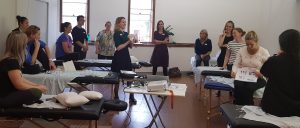 Treatment models, and direct and indirect techniques demonstrated are based on the latest clinical guidelines for reducing pelvic floor delivery trauma, managing pelvic girdle pain, and the prevention of post-partum complications in the short and long term. You will learn useful self-management tips that patients can utilize during pregnancy, in birth-planning and the post-partum period.
Treatment models, and direct and indirect techniques demonstrated are based on the latest clinical guidelines for reducing pelvic floor delivery trauma, managing pelvic girdle pain, and the prevention of post-partum complications in the short and long term. You will learn useful self-management tips that patients can utilize during pregnancy, in birth-planning and the post-partum period.
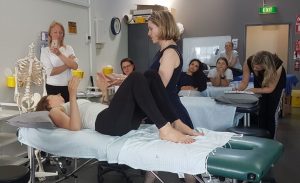
The Pain & Pregnancy course is applicable to all allied health manual therapy practitioners with no prior experience treating pregnancy pain required. It will include practical examination and treatment protocols you will be able to immediately use with confidence in your practice.
The course will run from 8:30 AM to 4 PM. It includes morning and afternoon tea, e-notes and an e-certificate of attendance for your CPD records. The course can be counted as 7 hours CPD.
After completing this course attendees will have the opportunity to attend Liz Howard’s Pelvic Pain Puzzle course which teaches the management of pelvic and perineal pain.
Advanced Pain Management Osteopath Liz Howard practices at the Women's Health & Research Institute of Australia, a specialist pelvic pain clinic in Sydney. She holds a Master of Science in Medicine (Pain Management) from USYD in 2013 and has over 25 years’ of experience as an osteopath, including pain education and as a clinical specialist in sacral neuromodulation.
Liz has more than 16 years’ of experience teaching at Australian universities and as a CPD provider. Her teaching experience ranges from course writing, presenting lectures and practicum in Undergraduate and Master’s Osteopathic programs (University of Western Sydney, Southern Cross University), clinical supervision of Osteopathic students (UWS, SCU, SportsMed Mumbai), to presentations at many professional associations including RANZCOG (Royal Australian & New Zealand College of Obstetrics & Gynaecology), AGES (Australasian Gynaecological Endoscopy & Surgery), NSANZ (Neuromodulation Society of Australia and New Zealand), Osteopathy Australia National Conference presentation, Pregnancy Massage Australia, Pelvic Floor Seminars, GP education evenings and international allied health events, most recently in Ireland, Sweden and New Zealand.
Find out more about Liz Howard's experience here.
Organisation and venue was great which left participants comfortable to concentrate on the excellent delivery of very helpful and relevant information and instruction. Well done everyone involved and a big thank you to Liz for so generously sharing her skill and expertise.
Gopi McLeod
This was hands down one of the best courses I have attended! The balance of updated info, the course structure and the hands on practice was brilliant. I especially enjoyed that you tailored the course to the attendees and the one day course structure so that I don't feel burned out on the weekend and it didn’t impact work as much as a two day course may have. Thank you very much to all of the tutors and Liz for your guidance and support.
Casey Beaumont
Clear instruction, straight to the point, no wasting time.
Leonardo Viola
Fascia is often the missing link for addressing persistent pain, pain after a fall or injury, immobilisation, recurrent acute back pain, movement restriction after surgery, post-surgical pain, contusion injuries, scar tissue and more.
There is a huge amount of current research to support how osteopaths work with the fascia in a holistic way to improve patient outcomes. This includes anatomical connections derived from embryology, neurovascular supply, connective tissue mechanics and mechanotransduction, interactions of the fascia with inflammation, cellular messengers, hormones and the immune system.
A thorough understanding of the physiology and pathophysiology of the fascial systems can help inform patient education, tailored movements and specific rehabilitation that is quite different to how we approach muscular dysfunction. Liz Howard has translated this research into a simple assessment and treatment model for local and global fascial dysfunction, to help select the best treatment techniques and self-management for your individual patient.
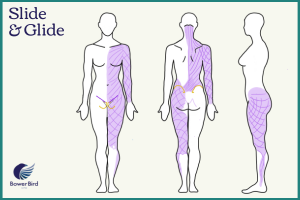
Learning Objectives
Related Learning
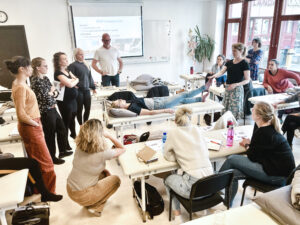
Attendees also have the opportunity to attend Liz Howard’s Exploring Visceral Fascia course which will look at the deeper chains in more detail, including viscero-fascial contributors to pain or dysfunction.
Course Details
The Myofascial Release course is applicable to all allied health manual therapy practitioners. It will include practical examination and treatment protocols you will be able to use with confidence in your practice.
The course will run from 8:30AM to 4PM. Places are limited to 12 attendees. It also includes morning and afternoon tea, e-notes and an e-certificate of attendance for your CPD records. The course can be counted as 6 hours CPD.
About the Presenter
Advanced Pain Management Osteopath Liz Howard practices at the Women's Health & Research Institute of Australia, a specialist pelvic pain clinic in Sydney. She holds a Master of Science in Medicine (Pain Management) from USYD in 2013 and has over 25 years’ of experience as an osteopath, including pain education and as a clinical specialist in sacral neuromodulation.
Liz has more than 16 years’ of experience teaching at Australian universities and as a CPD provider. Her teaching experience ranges from course writing, presenting lectures and practicum in Undergraduate and Master’s Osteopathic programs (University of Western Sydney, Southern Cross University), clinical supervision of Osteopathic students (UWS, SCU, SportsMed Mumbai), to presentations at many professional associations including RANZCOG (Royal Australian & New Zealand College of Obstetrics & Gynaecology), AGES (Australasian Gynaecological Endoscopy & Surgery), NSANZ (Neuromodulation Society of Australia and New Zealand), Osteopathy Australia National Conference presentation, Pregnancy Massage Australia, Pelvic Floor Seminars, GP education evenings and international allied health events, most recently in Ireland, Sweden and New Zealand.
Find out more about Liz Howard's experience here.
Have you considered treating the liver for neck pain after a whiplash injury?
Do you know how to assess for restriction within the abdominal fascia after a surgery?
Sick of treating back pain without any new tricks?
From the head to the pelvis and beyond, the visceral fascia is one of the most complex fascias in the body and fundamentally involved with distributing the major neurovasculature to the thoracic, abdominal and pelvic systems.
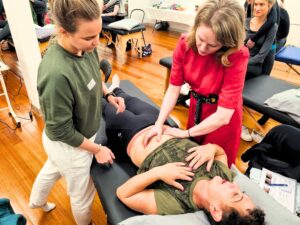 The connections of the visceral fascia to MSK structures are often overlooked when considering pain presentations that don't change with usual manual therapy techniques. Visceral fascial has strong connections throughout the body that can be affected with injuries that involve a fast moving force such as whiplash, a blunt trauma or a previous abdominal surgery.
The connections of the visceral fascia to MSK structures are often overlooked when considering pain presentations that don't change with usual manual therapy techniques. Visceral fascial has strong connections throughout the body that can be affected with injuries that involve a fast moving force such as whiplash, a blunt trauma or a previous abdominal surgery.
Learning to identify and treat visceral fascia can be the missing link to addressing all kinds of MSK issues in ways that you may not consider.
In this course from advanced pain management osteopath Liz Howard you will learn to confidently examine and treat visceral fascia contributors to pain or dysfunction. You will practice a range of effective techniques and treatment models that will enable you to confidently treat the supportive fascia of the thorax and abdominal viscera, including links to the musculo-skeletal system.
Exploring Visceral Fascia has a strong practical focus including treatment models (patient education and self-management tools) that you can use immediately in your practice to improve patient outcomes.
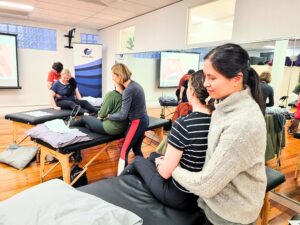 Related Learning
Related LearningThis course follows on from Liz Howard’s Myofascial Release or Myofascial Release Online course which explores the functional anatomy and amazing properties of fascia and introduces assessment, protocols and techniques to address myofascial restrictions and contributors to pain.
Attendees can choose to register for Myofascial Release Online as well as Exploring Visceral Fascia and recieve 20% off. Select the Visceral registration + Myofascial Online ticket option.
The Exploring Visceral Fascia course is applicable to all allied health manual therapy practitioners. It will include practical examination and treatment models you will be able to use with confidence in your practice.
The course will run from 8:30AM to 4PM. Places are limited to 20 attendees. It also includes morning and afternoon tea, printed notes and an e-certificate of attendance for your CPD records. The course can be counted as 6 hours CPD.

Advanced Pain Management Osteopath Liz Howard practices at the Women's Health & Research Institute of Australia, a specialist pelvic pain clinic in Sydney. She holds a Master of Science in Medicine (Pain Management) from USYD in 2013 and has over 25 years’ of experience as an osteopath, including pain education and as a clinical specialist in sacral neuromodulation.
Liz has more than 16 years’ of experience teaching at Australian universities and as a CPD provider. Her teaching experience ranges from course writing, presenting lectures and practicum in Undergraduate and Master’s Osteopathic programs (University of Western Sydney, Southern Cross University), clinical supervision of Osteopathic students (UWS, SCU, SportsMed Mumbai), to presentations at many professional associations including RANZCOG (Royal Australian & New Zealand College of Obstetrics & Gynaecology), AGES (Australasian Gynaecological Endoscopy & Surgery), NSANZ (Neuromodulation Society of Australia and New Zealand), Osteopathy Australia National Conference presentation, Pregnancy Massage Australia, Pelvic Floor Seminars, GP education evenings and international allied health events, most recently in Ireland, Sweden and New Zealand.
Find out more about Liz Howard's experience here.
It had heaps of relevant information which was delivered in a really easy to understand and enjoyable manner. Liz was a fantastic presenter and the printed course notes were a huge help. I found the case studies really useful as they were helpful in terms of understanding how the fascial techniques could be applied and also from the note-keeping perspective.
Fiona Spring
Liz is by far one of my favourite presenters. She is down to earth and very approachable but has such a wealth of knowledge and experience and a great way of distilling and presenting information. The content was perfectly contained, with just the right amount of material to come away with something to use straight away and not feel overwhelmed.
The courses are always a really reasonably price, which I appreciate. The online content was well presented and easy to watch.
Sara Jane Hammond
The information was imparted with clarity and ease. The group was small, which made for a fully engaged learning experience.
Liz is a wonderful teacher. She doesn't come from a place of ego-driven boasting, which many presenters do, but communicates well and shares her knowledge generously.
It was a fabulous course which I thoroughly enjoyed and have put to good use in my daily practice.
Sarah Simpson-Goff
Treating pelvic pain is a common, yet challenging area of practice. The contributing factors can be multiple and the presentation may seem like a complex puzzle. Patients are often embarrassed to speak about their symptoms meaning allied health has a unique opportunity to spend more time with the patient to develop the rapport and trust required for this intimate area.
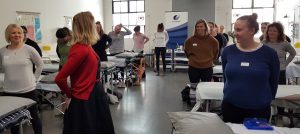
In this course you will review the embryology, anatomy, physiology and common presentations of the pelvic region to help unravel the pelvic pain puzzle for your patients. Conditions covered include pudendal neuralgia and visceral pain such as dysmenorrhea and endometriosis.
Gain an up-to-date understanding of the normal function of the female pelvis and organs, how dysfunction presents clinically and learn the treatment models, and direct and indirect techniques that Liz uses in daily practice when treating pelvic pain presentations
The Pelvic Pain Puzzle CPD course will cover;
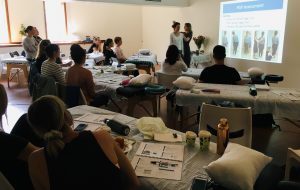
The Pelvic Pain Puzzle course is applicable to allied health manual therapy practitioners with an interst in treating pelvic pain. It has a strong practical focus and includes appropriate manual therapy techniques that you can immediately use with confidence in your practice. Internal techniques will not be demonstrated.
The course will run from 8:30AM to 4PM. Places are limited to 12 attendees. It includes morning and afternoon tea, printed course notes and an e-certificate of attendance for your CPD records. The course can be counted as 7 hours CPD.
This course follows on from Liz Howard’s popular Pain & Pregnancy course which teaches practitioners to effectively help women during pregnancy (pelvic girdle pain etc), prepare for labour and recover efficiently from delivery or caesarean section. In this course pelvic girdle pain will be reviewed but not addressed in depth.

Advanced Pain Management Osteopath Liz Howard practices at the Women's Health & Research Institute of Australia, a specialist pelvic pain clinic in Sydney. She holds a Master of Science in Medicine (Pain Management) from USYD in 2013 and has over 25 years’ of experience as an osteopath, including pain education and as a clinical specialist in sacral neuromodulation.
Liz has more than 16 years’ of experience teaching at Australian universities and as a CPD provider. Her teaching experience ranges from course writing, presenting lectures and practicum in Undergraduate and Master’s Osteopathic programs (University of Western Sydney, Southern Cross University), clinical supervision of Osteopathic students (UWS, SCU, SportsMed Mumbai), to presentations at many professional associations including RANZCOG (Royal Australian & New Zealand College of Obstetrics & Gynaecology), AGES (Australasian Gynaecological Endoscopy & Surgery), NSANZ (Neuromodulation Society of Australia and New Zealand), Osteopathy Australia National Conference presentation, Pregnancy Massage Australia, Pelvic Floor Seminars, GP education evenings and international allied health events, most recently in Ireland, Sweden and New Zealand.
Find out more about Liz Howard's experience treating pelvic pain here.
I thought the course was fantastic! Incredibly well presented, very concise and interactive, and left me feeling confident and enthusiastic about applying it to my practice.
Jane Edmondson
Liz is an inspiring and engaging presenter, she shares extensive clinical knowledge of pelvic and perineal pain by way of case studies and current evidence-based practice protocols. Liz relates current clinical application models for chronic pain seamlessly with familiar osteopathic principles. This course has helped me to develop my confidence in diagnosing and treating patients with pelvic and perineal pain in a way that is immediately transferable to my every day practice.
Bimbi Joy
Loved that it was not too overwhelming and built on lots of techniques we have all learnt! Best course I've been to in a while.
Rebecca Brugman
Liz was a knowledgeable and witty presenter. She explained her material and linked it to research which I appreciated. I liked that her techniques were functional based, often these are overlooked and aren't linked to research. I also like how she discussed how she problem solves in practice. I found the practical side really easy to integrate into practice and very relatable.
ANON
I loved the way the presentation flowed, it was easy to follow and had great info on the slides. I also loved the practical, Liz came around and gave great feedback. The snacks were also amazing. The pre-learning videos were incredibly helpful and the notes I took from it have been a great resource for me to refer back to.
Olivia
Liz. She's fabulous. Dynamic, relatable, knowledgeable, I could go on...
Amanda Viedma-Dodd
Treating pelvic pain is a common, yet challenging area of practice. The contributing factors can be multiple and the presentation may seem like a complex puzzle. Patients are often embarrassed to speak about their symptoms meaning allied health has a unique opportunity to spend more time with the patient to develop the rapport and trust required for this intimate area.

In this course you will review the embryology, anatomy, physiology and common presentations of the pelvic region to help unravel the pelvic pain puzzle for your patients. Conditions covered include pudendal neuralgia and visceral pain such as dysmenorrhea and endometriosis.
Gain an up-to-date understanding of the normal function of the female pelvis and organs, how dysfunction presents clinically and learn the treatment models, and direct and indirect techniques that Liz uses in daily practice when treating pelvic pain presentations
The Pelvic Pain Puzzle CPD course will cover;

The Pelvic Pain Puzzle course is applicable to allied health manual therapy practitioners with an interst in treating pelvic pain. It has a strong practical focus and includes appropriate manual therapy techniques that you can immediately use with confidence in your practice. Internal techniques will not be demonstrated.
The course will run from 8:30AM to 4PM. Places are limited to 20 attendees. It includes morning and afternoon tea, printed course notes and an e-certificate of attendance for your CPD records. The course can be counted as 7 hours CPD.
This course follows on from Liz Howard’s popular Pain & Pregnancy course which teaches practitioners to effectively help women during pregnancy (pelvic girdle pain etc), prepare for labour and recover efficiently from delivery or caesarean section. In this course pelvic girdle pain will be reviewed but not addressed in depth.

Advanced Pain Management Osteopath Liz Howard practices at the Women's Health & Research Institute of Australia, a specialist pelvic pain clinic in Sydney. She holds a Master of Science in Medicine (Pain Management) from USYD in 2013 and has over 25 years’ of experience as an osteopath, including pain education and as a clinical specialist in sacral neuromodulation.
Liz has more than 16 years’ of experience teaching at Australian universities and as a CPD provider. Her teaching experience ranges from course writing, presenting lectures and practicum in Undergraduate and Master’s Osteopathic programs (University of Western Sydney, Southern Cross University), clinical supervision of Osteopathic students (UWS, SCU, SportsMed Mumbai), to presentations at many professional associations including RANZCOG (Royal Australian & New Zealand College of Obstetrics & Gynaecology), AGES (Australasian Gynaecological Endoscopy & Surgery), NSANZ (Neuromodulation Society of Australia and New Zealand), Osteopathy Australia National Conference presentation, Pregnancy Massage Australia, Pelvic Floor Seminars, GP education evenings and international allied health events, most recently in Ireland, Sweden and New Zealand.
Find out more about Liz Howard's experience treating pelvic pain here.
I thought the course was fantastic! Incredibly well presented, very concise and interactive, and left me feeling confident and enthusiastic about applying it to my practice.
Jane Edmondson
Liz is an inspiring and engaging presenter, she shares extensive clinical knowledge of pelvic and perineal pain by way of case studies and current evidence-based practice protocols. Liz relates current clinical application models for chronic pain seamlessly with familiar osteopathic principles. This course has helped me to develop my confidence in diagnosing and treating patients with pelvic and perineal pain in a way that is immediately transferable to my every day practice.
Bimbi Joy
Loved that it was not too overwhelming and built on lots of techniques we have all learnt! Best course I've been to in a while.
Rebecca Brugman
Liz was a knowledgeable and witty presenter. She explained her material and linked it to research which I appreciated. I liked that her techniques were functional based, often these are overlooked and aren't linked to research. I also like how she discussed how she problem solves in practice. I found the practical side really easy to integrate into practice and very relatable.
ANON
I loved the way the presentation flowed, it was easy to follow and had great info on the slides. I also loved the practical, Liz came around and gave great feedback. The snacks were also amazing. The pre-learning videos were incredibly helpful and the notes I took from it have been a great resource for me to refer back to.
Olivia
Liz. She's fabulous. Dynamic, relatable, knowledgeable, I could go on...
Amanda Viedma-Dodd
Nerve pain and sensitivity can present in many ways in practice and the symptoms vary widely; from tingling, itching, burning, stinging, feeling tight, swollen, bigger or odd, sharp shooting, deep nagging ache, ants crawling and everything in between.

Nerve pain triggers are often complex and multifactorial, and neural tissue involvement can be subtle in the early days, often mimicking or co-existing with simple mechanical pain. As primary healthcare practitioners, it is important to recognize and manage any neural component to your patients’ pain early to support their recovery and help prevent ongoing pain and disability.
In Nerve Pain in Practice Liz Howard has translated a vast body of research into an evidence-informed osteopathic approach to assessing and treating the neuro-endocrine-immune system. She utilises the current evidence from pain science, fascial research, neurodynamics and clinical trials to support traditional osteopathic treatment models.
Apply your palpation skills and manual therapy techniques for fascia (connective tissue) to the peripheral nervous system. Liz will guide you in this rewarding area of practice via efficient, ergonomic, and safe techniques in young, older and the most sensitive and fragile patients.
The course will feature pre-learning videos and face-to-face learning to cover;
By the end of this course, you will be able to
The Nerve Pain in Practice course is applicable to all allied health manual therapy practitioners with no experience with indirect techniques required. It includes practical examination and treatment protocols for treating nerve pain that you will be able to use with confidence in your clinical practice.
The course will run from 8:30AM to 4PM. Places are limited to 20 attendees. It includes morning and afternoon tea, printed course notes and an e-certificate of attendance for your CPD records. The course can be counted as 9 hours CPD and will include around 1.5 hours of pre-learning videos.

Liz Howard (Advanced Pain Management Osteopath) has many years of treating nerve pain in the pelvis and in general practice (peripheral nerve pain), providing her with unique clinical experience through the lens of the latest pain science.
Liz practices at the Women's Health & Research Institute of Australia, a specialist pelvic pain clinic in Sydney. She holds a Master of Science in Medicine (Pain Management) from USYD in 2013 and has over 25 years’ of experience as an osteopath, including pain education and as a clinical specialist in sacral neuromodulation.
Liz has more than 16 years’ of experience teaching at Australian universities and as a CPD provider. Her teaching experience ranges from course writing, presenting lectures and practicum in Undergraduate and Master’s Osteopathic programs (University of Western Sydney, Southern Cross University), clinical supervision of Osteopathic students (UWS, SCU, SportsMed Mumbai), to presentations at many professional associations including RANZCOG (Royal Australian & New Zealand College of Obstetrics & Gynaecology), AGES (Australasian Gynaecological Endoscopy & Surgery), NSANZ (Neuromodulation Society of Australia and New Zealand), Osteopathy Australia National Conference presentation, Pregnancy Massage Australia, Pelvic Floor Seminars, GP education evenings and international allied health events, most recently in Ireland, Sweden and New Zealand.
Find out more about Liz Howard's experience treating nerve pain here.